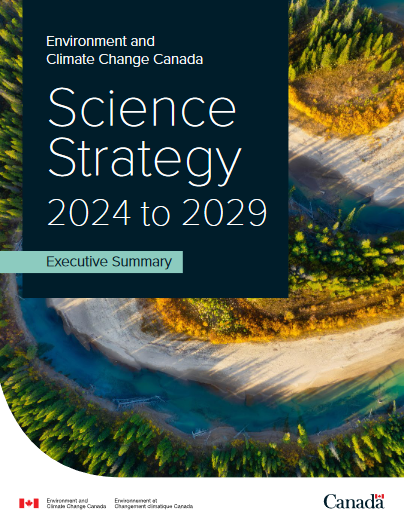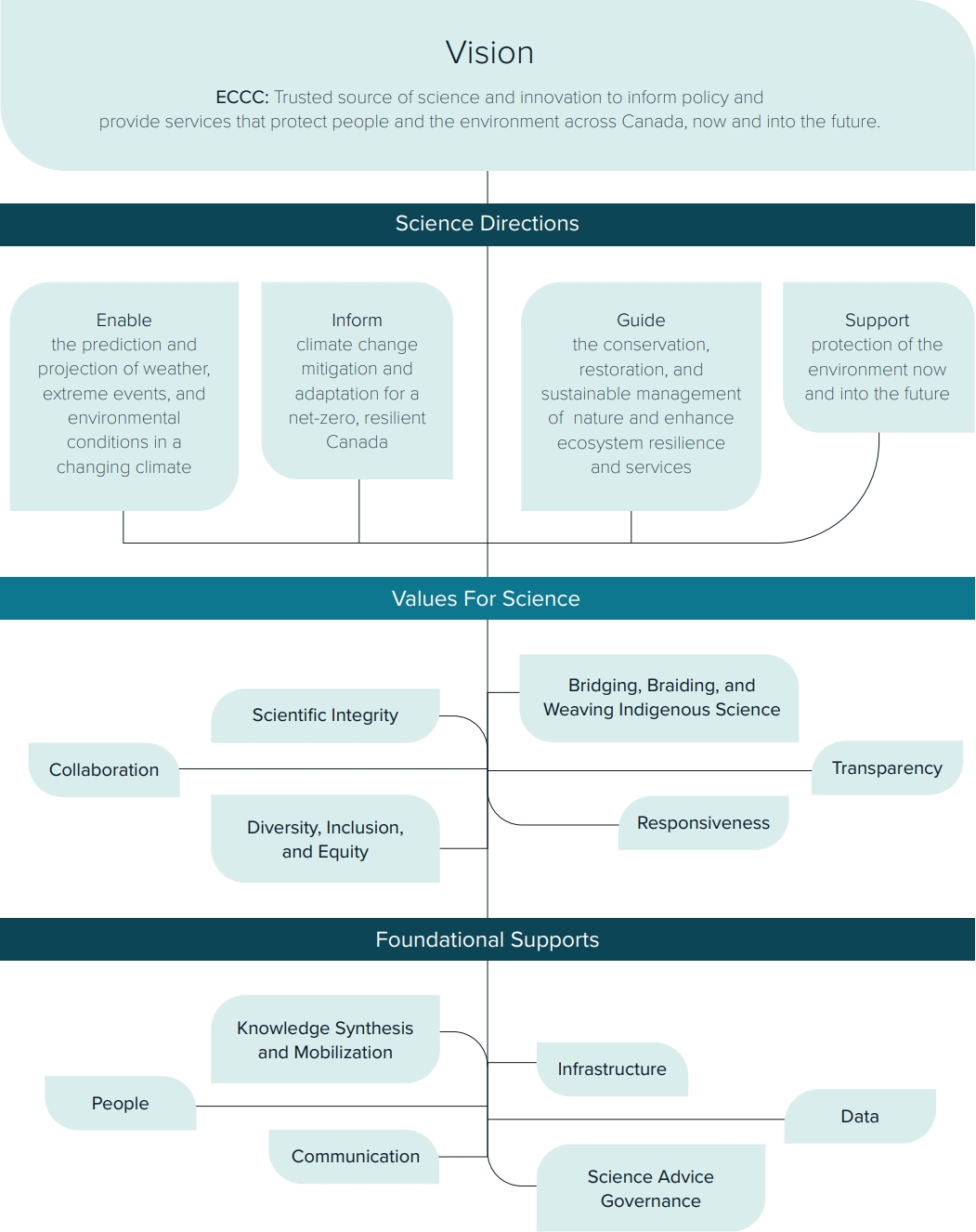Executive Summary of Environment and Climate Change Canada’s Science Strategy 2024 to 2029
Forward-looking science for the environmental challenges of today and the future

Download the alternative format
(PDF format, 2.97 MB, 13 pages)
The interconnected crises of climate change, pollution, and biodiversity loss are presenting threats to the environment like we have never seen before. Accelerated environmental damage and unprecedented extreme weather events are impacting the health, well-being, and economic prosperity of people living in Canada. These challenges place an ever-growing importance on forward-looking federal science to inform government policies, programs and services that protect the environment and people.
In this rapidly evolving context, Environment and Climate Change Canada (ECCC) has released our renewed Science Strategy 2024-29. The Strategy tells our Department’s science story – who we are, what we do, and how we deliver as a science-based organization to address environmental challenges. By emphasizing the diversity and talent of our people, the strength of our partnerships, and innovation in how we work, ECCC science will continue to support an evidence-informed, whole-of-society approach to meet the environmental challenges of today and the future.

Text description
Vision
- ECCC: Trusted source of science and innovation to inform policy and provide services that protect people and the environment across Canada, now and into the future
Science directions
- Enable the prediction and projection of weather, extreme events, and environmental conditionsin a changing climate
- Inform climate change mitigation and adaptation for a net-zero, resilient Canada
- Guide the conservation, restoration, and sustainable management of nature and enhance ecosystem resilience and services
- Support protection of the environment now and into the future
Values for science
- Scientific integrity
- Diversity, inclusion, and equity
- Bridging, braiding, and weaving Indigenous science
- Collaboration
- Responsiveness
- Transparency
Foundational supports
- Knowledge synthesis and mobilization
- People
- Science advice governance
- Communication
- Data
- Infrasture
Our vision for ECCC science
ECCC: Trusted source of science and innovation to inform policy and provide services that protect people and the environment across Canada, now and into the future.
Our people, our values
Across Canada and through international collaboration, teams of dedicated ECCC professionals advance, apply, and communicate scientific knowledge. The excellence of ECCC science is grounded in their commitment to values and ethics. This updated 2024-29 ECCC Science Strategy emphasizes six of those values at its core:
- Scientific integrity
- Responsiveness
- Collaboration
- Bridging, braiding, and weaving Indigenous science
- Diversity, inclusion, and equity
- Transparency
Our focus, our science directions
ECCC has identified four forward-looking science directions to support the Department’s priorities over the coming years. These science directions build on our core mandate and will help ECCC anticipate and respond to the evolving nature of pressing national and international environmental issues.
Enable the prediction and projection of weather, extreme events, and environmental conditions in a changing climate
High-impact weather-related events such as flooding, heat waves, wildfires, tornadoes, and poor air quality can lead to disastrous consequences. Scientists expect these extreme weather events to intensify and increase in frequency. In this context, ECCC weather and environmental products and services can be improved by:
- Applying integrated and multi-scale approaches
- Addressing forecasting challenges in the Canadian context
- Enhancing data and information and making use of technological advances
- Advancing research in a changing Arctic
Inform climate change mitigation and adaptation for a net-zero, resilient Canada
Ambitious and urgent action is needed to limit further climate warming and to increase environmental and community resilience. ECCC has a key role to play in continuing to advance climate change science to address these needs and meet Canada’s emission reduction targets. ECCC science also informs risk-based decision-making to identify and respond strategically to the effects of climate change. Moving forward, ECCC science can inform climate change mitigation and adaptation by:
- Improving quantitative measuring and monitoring of greenhouse gases to achieve net-zero
- Advancing net-zero pathway science
- Learning more about the implications of climate change on biodiversity in terrestrial and aquatic ecosystems
- Gaining greater understanding of climate-altering technologies in the Canadian context
Guide the conservation, restoration and sustainable management of nature and enhance ecosystem resilience and services
Widespread and increasingly rapid loss of biodiversity threatens ecosystem functions and services essential to life on Earth. Over the coming years, ECCC science efforts that include meaningful collaboration with Indigenous Peoples can improve biodiversity and ecosystem outcomes by:
- Strengthening the understanding of wildlife and their habitats
- Enhancing the ability to assess and predict threats to biodiversity
- Advancing solution-oriented research and mobilizing scientific knowledge into conservation action
Support protection of the environment now and into the future
Science helps to identify and better understand the evolving risks and impacts of pollution and harmful substances in the environment. It also informs emergency response and risk management measures. Over the coming years, ECCC science efforts can support the protection of people and the environment by:
- Advancing science to prevent, manage, reduce, or eliminate harmful pollutants in the environment
- Modernizing how risks are assessed
- Informing impact assessments
- Enhancing collaboration in science-based efforts to support environmental protections
- Supporting the management of water for the common good
Foundational supports
The Department’s science efforts rely on a range of supports, mechanisms, and management practices. These supports are strengthened from within ECCC, and by enhancing collaboration with other government departments and agencies, Indigenous Peoples, academia, industry, and other key partners. The Strategy focuses on six interrelated foundations for sustained science excellence:
- Governance
- People
- Infrastructure
- Data
- Communication
- Knowledge synthesis and mobilization
Our path forward
The ECCC Science Strategy 2024-2029 sets out an ambitious framework to guide our Department’s science. Implementing the Strategy will involve realizing these concepts in our daily work. Sustained collaboration within the Department, and with external partners, will be crucial to success.
Periodic review will assess the Strategy’s success and continued relevance. This process can inform any adjustments to keep pace with emerging challenges and promising scientific and technological advancements.
This Strategy represents a strong and adaptable commitment to the role of ECCC science in achieving a greener, more sustainable future.